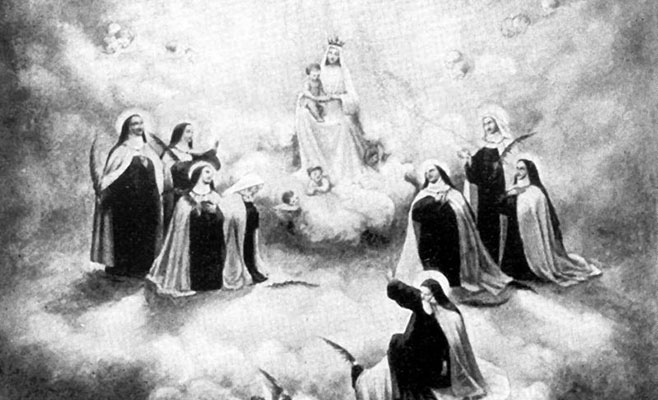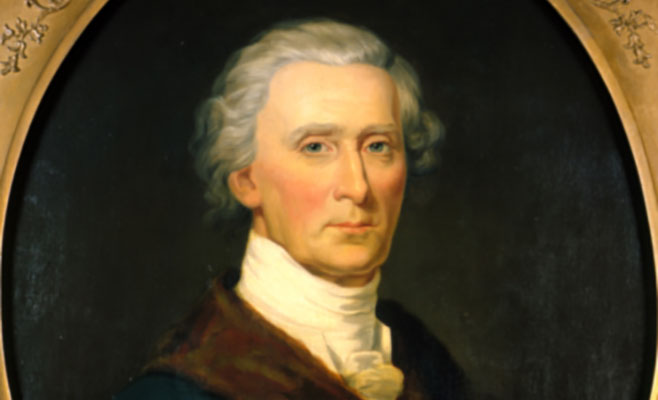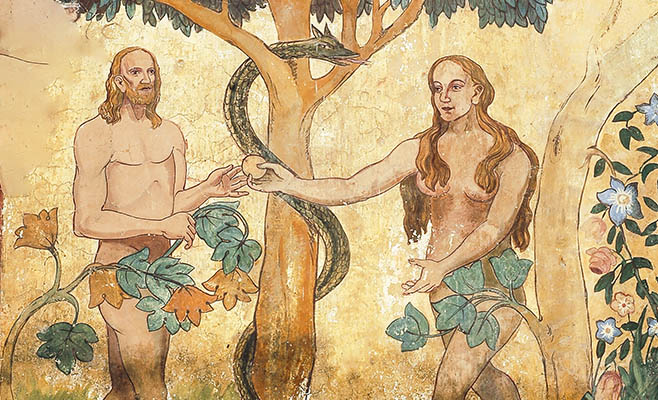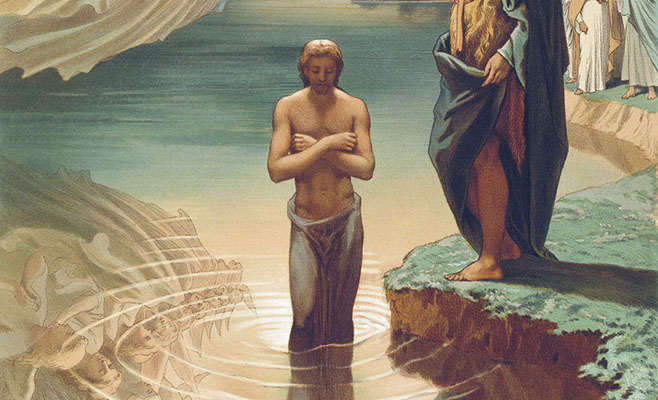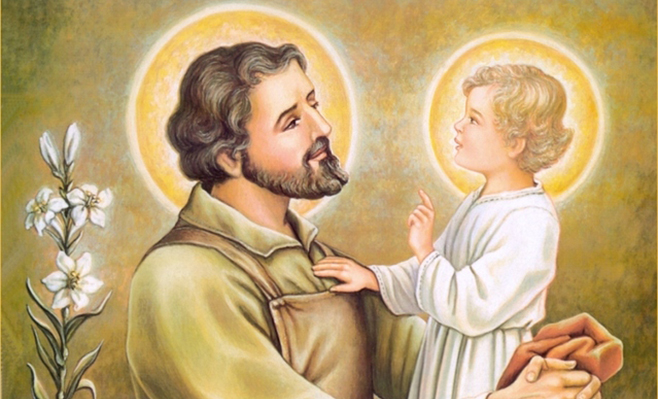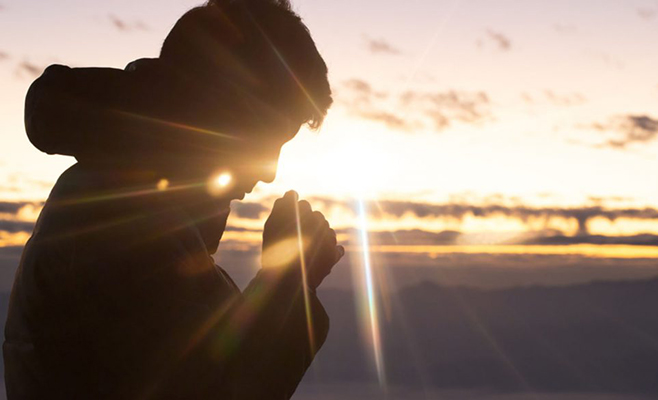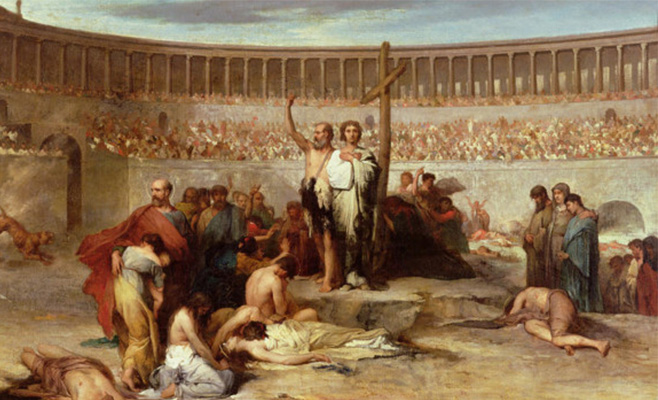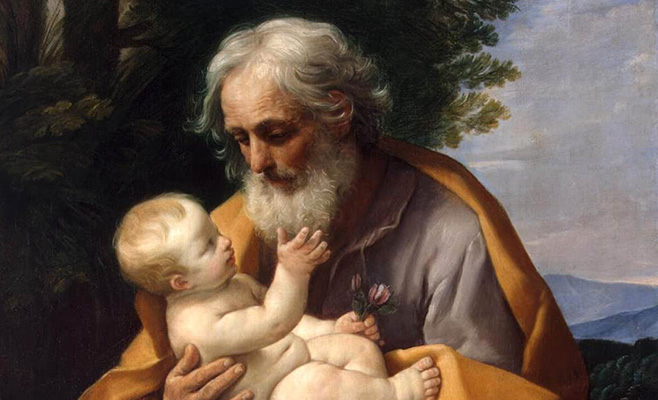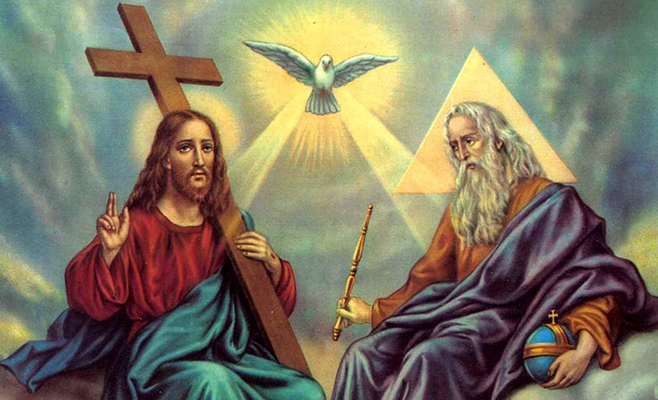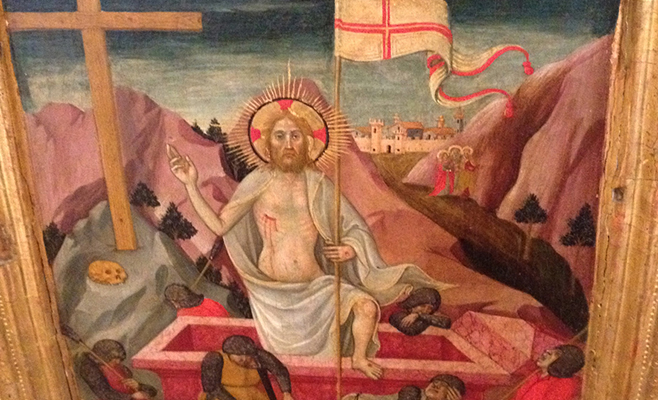16 Carmelites Martyrs
Homily 16th Sunday Year B: The French Revolution & 16 Carmelites Martyrs
Fr. Dwight P. Campbell, S.T.D.
“Behold, the days are coming, says the Lord, when I will raise up a righteous shoot to David; as king he shall reign and govern wisely.” (Jer. 23:5)
These are the words of the O.T. Prophet Jeremiah, foretelling the coming of Christ as King. Jesus has already come and founded His Church, His Kingdom on earth. Our duty is to help extend His Kingdom, the social reign of Christ the King, until He comes again in glory.
This past Wednesday, July 14, the French celebrated Bastille Day: the storming of the Bastille, a military fortress and prison in Paris, which marked the beginning of the French Revolution.
The French Revolution was co-opted and controlled by radical, anti-Catholic, God-hating atheists.
French Revolution at its core was a demonic attempt to crush Catholicism and faith in Jesus Christ, the King of kings and Lord of lords.
These radicals, after lopping off the heads of their King, Louis XVI, and his wife, Marie Antoinette, changed the days of the week. They eliminated Sunday as God’s day; and changed the calendar – no feast days of saints.
In the Notre Dame Cathedral, the government took out the Blessed Sacrament, the Real, Substantial Presence of Christ in the Eucharist, and erected in its place a statue of a woman representing the goddess of reason.
I wonder if she looked like Pachamama – the Mother Earth goddess that modern day pagans in Peru and Bolivia worship, and who, by the way, is very much like the goddess Astarte, who back in O.T. times was the mother goddess of the Canaanite people; on Mount Carmel the great Prophet Elijah – founder of the Carmelite order – challenged the pagan prophets of Baal and Astarte and destroyed them. (See “EWTN’s Fr. Mitch Pacwa condemns Pachamama ‘worship’ at Amazon Synod,” LifeSiteNews, Nov. 7, 2019).
On Feb. 13, 1790, the government forbade the taking of religious vows, and it wickedly went on a search and destroy mission for any violators.
A little over two years later, in September, 1792, government authorities seized the Carmelite convent in Compiegne, a town 50 miles north of Paris, and forced the nuns there to live separately and abandon their habits, which were considered “offensive to republican eyes.”
Although they lived separately, they continued to meet and pray in secret for two years until someone reported them. On June 22, 1794 they were arrested
This was during the worst period of the French Revolution, known as the Reign of Terror, which lasted from Sept. 5, 1793 to July 27, 1794: the faithful were persecuted; many priests and nuns from religious orders fled or went into hiding; but many were arrested; many were guillotined.
Many historians agree that the French Revolution gave birth to atheistic communism. One of the pillars of the atheistic communist State is control of the media: You hear and read only what the government permits you to hear and read.
Pravda – which was the official news organ of the communists is Russia, means “Truth” – i.e., the only “truth” that the government permits you to hear or to read in print or social media.
Government control of social media, and censorship of what the government does not want you to hear or read, effectively takes away the right to freedom of speech, which is guaranteed under the First Amendment to our Constitution.
That’s the first step. Then comes restrictions on, and eventually elimination of, freedom of religion:
This happened in France during French Revolution under its atheistic government; in Russia under atheistic communism; and its happening now in communist China, where Xi Jinping has ordered that no child under 18 years of age may attend a religious service, and no expression of opposition to the government is permitted.
In fact, the Chinese people – with the help of big tech companies like Google – monitor their people, who get “social credit” points added or taken away.
An example: just recently a Chinese student was interviewed walking to class on the campus of a college here in the U.S. She said should could not stop and talk because her government is able to track her with her cell phone (which she must carry), and if she takes too much time going from her room to class, she will lose social credit points and jeopardize her status as a student.
Here is some interesting news you may not have not heard; or if you did, it’s likely you did not hear any criticism of it from the big media outlets like CNN and MSNBC:
At a press conference this past Thursday, President Biden’s press secretary, Jen Psaki, admitted (incredibly) that the federal government is collaborating with big social media platforms like Facebook to censor the free exchange of ideas and free speech – specifically regarding the Wuhan Covid-19 virus.
Here’s what Jen Psaki said [per The New York Post, July 15, 2001]:
“We are in regular touch with the social media platforms and . . . through members of our senior staff and also members of our COVID-19 team — given . . . this is a big issue, of misinformation, specifically on the pandemic.”
She added: “We’ve increased disinformation research and tracking . . . We are flagging problematic posts for Facebook that spread disinformation.” “Facebook needs to move more quickly to remove harmful violative posts.”
So, the federal government is collaborating with Facebook and other social media platforms to “track” us – anyone who spreads what it considers “dis-information” or views and opinions it considers “harmful”; and to “remove” opinions posted by people that the government considers “violative.”
Gee, could that be you and me? (My aunt is popular on social media, and she has been censored many times for expressing her opinion on various issues.)
So, Biden’s press secretary has just proclaimed censorship by the federal government of the free exchange of ideas – which for the time being, concerns only the Wuhan Covid-19 virus.
This follows on a series of statements from health officials who contradicted themselves throughout the pandemic on issues such as:
the effectiveness of wearing masks (the previous Surgeon General, Jerome Adams, originally said no, then yes to masks),
and that COVID-19 leaked from a Chinese lab in the Wuhan Province – which Facebook at first censored, but now is pretty much an accepted fact.
There are a lot of differing views by accredited medical doctors and scientists regarding how to treat those who contract the Wuhan virus, the effectiveness of treatments, etc.
One of the pillars of our nation at its founding was freedom of speech: that’s why it’s listed in the First Amendment to the Constitution – right after freedom of religion.
Is our federal government going to censor me – or arrest me – for saying things which some bureaucrat considers “disinformation” or “violative” of some official policy? – Like, for example, that I think it’s better for young people to just contract the virus and develop a natural immunity, rather than getting a shot – the long-term effects of which to their health, their immune system, and their fertility, are unknown?
I may disagree with your views on this; you may disagree with mine. But we both have a constitutionally protected right – actually, a God-given right that is recognized by our First Amendment – to express our views and opinions.
One of the pillars of our nation is the free exchange of ideas, opinions, theories, especially in areas of science and medical treatment, where theories are discarded and replaced by new, better ones all the time.
At the same press conference, current U.S. Surgeon General, Vivek Murthy, said “we’re asking [social media companies] to consistently take action against misinformation superspreaders on their platforms. Misinformation takes away our freedom to make informed decisions about our health.”
Really? How does “misinformation” take away our freedom to make informed decisions? To the contrary, the spread of information (even if it may be debatable), allows the free exchange of ideas, and gives people the freedom to choose what to believe, and what not to believe!
In a totalitarian regime, censorship of ideas and speech is always followed by censorship – and persecution – of religion, the truths taught by Jesus Christ.
This is what happened in France during the French Revolution. It happened in Communist Russia. It’s happening right now in Communist China. And I truly believe, it going to happen here in this country; maybe very soon:
You say that marriage is only between a man and woman? Well, that’s “misinformation”! Don’t you know that the Supreme Court has ruled that people of the same sex can marry?
You say that God intends every marital act be open to conceiving new human life, and that contraception and abortion are immoral? Don’t you know that the Supreme Court has ruled that both contraception and abortion are “rights” under our Constitution? What you’re saying violates social norms, is “offensive to republican [sensibilities],” and takes away “freedom” for people to choose whatever they want to do.
We live in dangerous times, my friends.
Now, let’s continue with the story of the 16 Carmelites. After their arrest they were transferred to a prison in Paris on July 12. On July 16, the Feast of Our Lady of Mount Carmel, they learned that they would face trial the next day.
They sang in prison: “Let our hearts be giv’n to joyfulness / The day of glory is now here! / Let us banish all our weakness. / We can see that the cross is now near! / Let us prepare ourselves for the victory! . . .”
The trial took place on the morning of July 17. They were found guilty and sentenced to death by guillotine that afternoon. By God’s providence, that was the day their prison garb was washed. They wore their Carmelite habits as they were wheeled by cart about two miles to the guillotine. They sang the whole time. The crowds the lined the streets usually shouted and jeered at those going to the guillotine. But before this scene, they were silent: Their Catholic consciences were being pricked at seeing Carmelite nuns going to the guillotine.
At the foot of the scaffold, each sister renewed her vows and asked the Mother Superior, “Permission to die, Mother?” To which they were told, “Go, my child!”
They all chanted the Veni, Creator Spiritus (Come, Holy Spirit) as one by one, they ascended the scaffold, and the guillotine fell on each one’s neck.
The Reign of Terror ended ten days later with the beheading the infamous Robesierre, of one of the leaders of the Revolution.
Let us invoke these 16 heroic Carmelite martyrs – who were beatified in 1904 by Pope St. Pius X and whose feast day is July 17 – to intercede for our nation, that it may return to God; and that the social reign of Jesus Christ, the King of kings and Lord of lords, may restore peace and order to our land, and every nation throughout the world, through the Blood which He shed on the Cross for our salvation.

